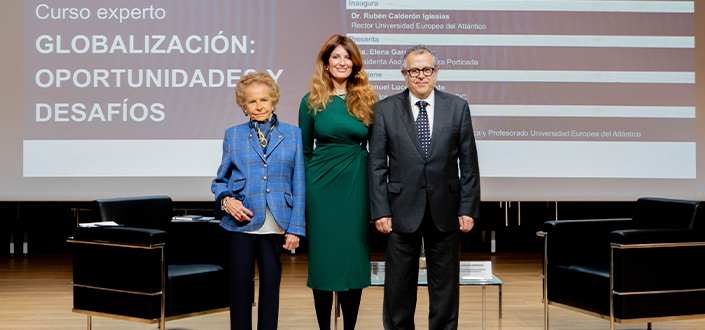The Universidad Europea del Atlántico (European University of the Atlantic, UNEATLANTICO), in collaboration with the Plaza Porticada Cultural Association, held an outstanding academic day with the expert course ‘Globalisation: Opportunities and Challenges’, which took place in the university’s Assembly Hall. The meeting brought together academic authorities, the media and representatives from the cultural and international relations spheres, with the aim of analysing the multiple factors that make up globalisation today.
The event was inaugurated by the rector of the university Rubén Calderón and presented by the president of the Plaza Porticada Cultural Association, Elena García Botín, who, after a brief summary of the association’s history, welcomed Manuel Lucena Giraldo, historian and researcher at the CSIC. Dr. Lucena Giraldo has been a visiting professor at prestigious universities such as Stanford, Harvard, Tufts (Boston), Pontificia Universidad Javeriana (Colombia), IVIC (Venezuela), Universidad de los Andes (Chile and Colombia), Colegio de México and St. Antony’s College, Oxford University.
Lucena offered a multidisciplinary, humanistic, cultural and profound intervention on the challenges facing the phenomenon of globalisation in its current phase, marked by geopolitical tensions, changes in social, technological and economic dynamics, as well as by a growing ideological polarisation.
During the session, Dr. Silvia Aparicio Obregón, Vice-Rector for Academic Organisation and Teaching Staff of UNEATLANTICO, moderated Dr. Lucena’s intervention through a series of carefully structured questions, which allowed to approach globalisation from multiple approaches, with special attention to its social, political and cultural implications.
Among the issues addressed, Dr Aparicio raised questions as to whether we are witnessing a new stage of fragmented ‘de-globalisation’, as a consequence of the growing tensions between geopolitical blocs (US-China, Russia-West), or whether it is still possible to speak of a homogeneous globalisation. The complex relationship between globalisation and local identities was also debated, especially in the face of the rise of nationalism in regions such as Catalonia and the Basque Country.
Another key axis of the conversation revolved around the impact of the new digital and social networks, which are transforming the way in which political and social movements are organised, replacing – in part – traditional structures such as diplomacy or the conventional media. To this was added a reflection on border cities as spaces of transit and integration, where migration can become an opportunity for social cohesion, rather than a source of exclusion.
Dr Aparicio also raised the issue of cultural mixing and its impact on the business world, asking whether more diverse organisations – with teams made up of people of different nationalities and cultures – have a greater capacity for innovation and adaptation. This led to an enriching discussion on cultural hybridisation as a driver of creativity.
The conversation also included an analysis of the role of collective emotions, especially in a context of growing political polarisation and hate speeches spread in digital environments. How to foster emotional literacy that allows societies to move towards more inclusive and cohesive models? -was one of the questions that guided this section of the dialogue.
Finally, the moderator addressed a highly topical issue: the need to reconcile global consumption with environmental sustainability. In a world marked by climate change and the ecological limits of the planet, it was discussed how to build a new consumption ethic that is compatible with the logic of the market and, at the same time, responsible for future generations. This reflection included the environmental impact of emerging technologies such as artificial intelligence, whose ecological footprint poses new ethical dilemmas.
The course concluded with an invitation to rethink the future from an optimistic narrative. In the face of the dystopian visions that dominate today – technological wars, climate crises, radical transformations of human beings – Dr. Lucena vindicated the role of the humanities and critical thinking as tools to recover utopia, imagine other possible worlds and build a more just and sustainable future.
The European University of the Atlantic thus reaffirms its commitment to intellectual debate, the promotion of knowledge and the training of critical citizens committed to their environment. The success of this conference adds to the history of collaboration between UNEATLANTICO and the Plaza Porticada Association, and anticipates new joint initiatives to continue promoting academic and cultural reflection from Cantabria to the world.


